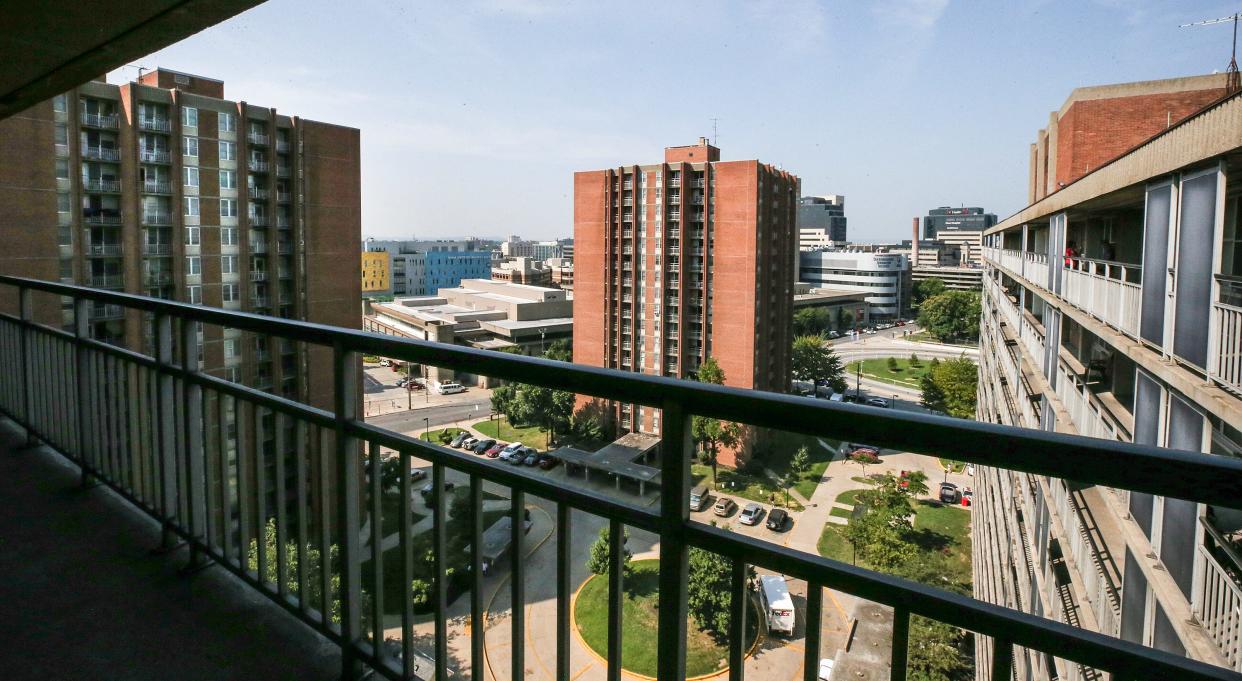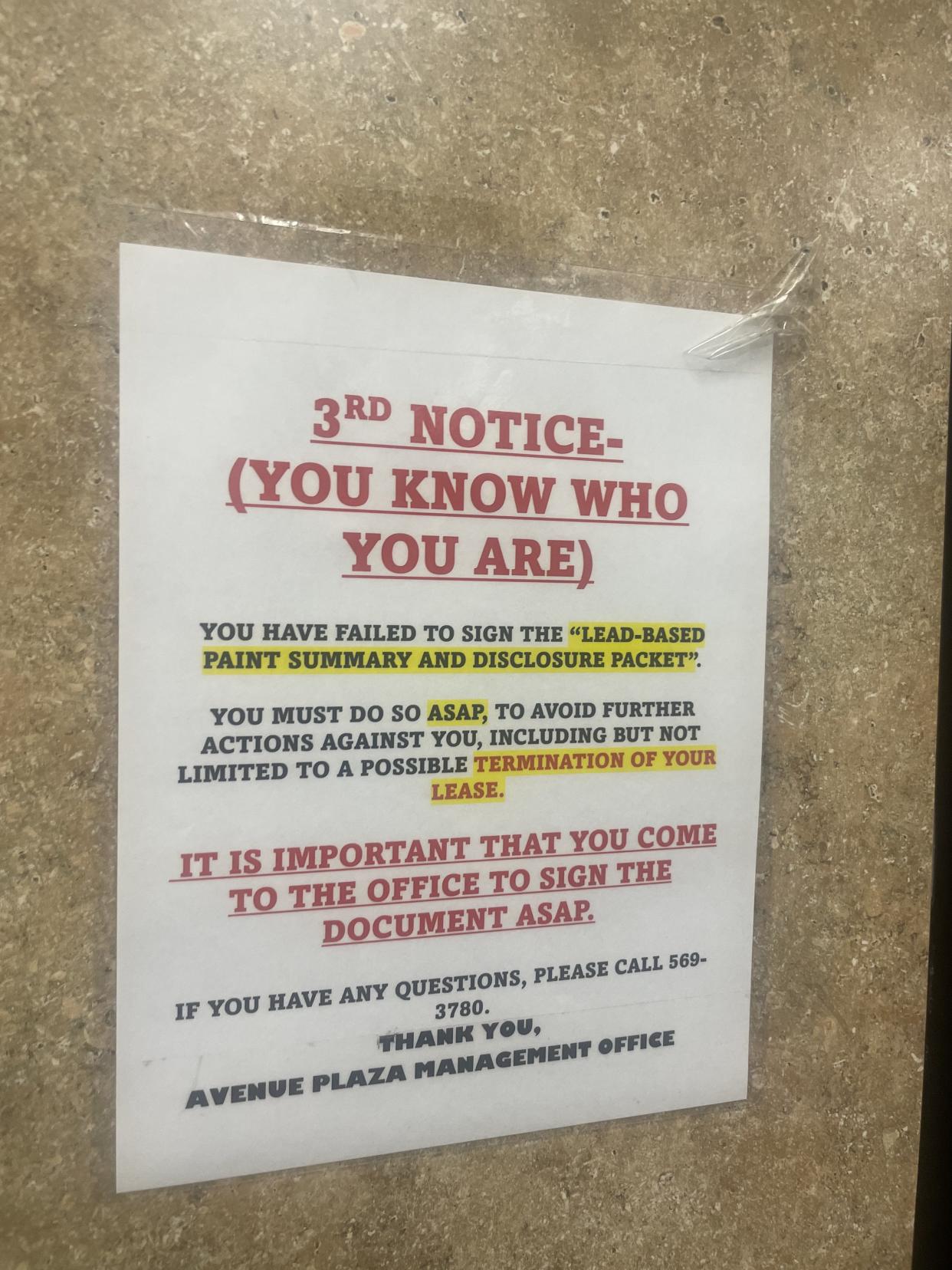Louisville Metro Housing Authority violated federal lead disclosure guidelines for decades
Residents of some Louisville Metro Housing Authority properties have been living in buildings with lead paint without knowing it. Now, the public housing authority is pushing residents to sign the federally mandated disclosure forms they should have received before they moved in — and has even threatened eviction if they refuse.
Lead is a neurotoxin that is especially dangerous to children under the age of six, but can also poison adults — causing headaches, abdominal pain, difficulties with memory and concentration and reproductive issues like low sperm count or miscarriages.
Lead paint was outlawed in 1978, but several LMHA properties, including Parkway Place, Dosker Manor and Avenue Plaza, were built before then.
Since 1996, the federal government has required the disclosure of known lead-based paint hazards to potential tenants. The rule “applies to public housing and its landlords, i.e., public housing agencies [PHAs], just as it does to private landlords and sellers,” the Department of Housing and Urban Development told The Courier Journal in an email.
However, multiple residents said they have lived in LMHA properties for decades without knowing there was lead paint in the building.

An “impromptu site visit” from the Department of Housing and Urban Development in the summer of 2022 to Parkway Place prompted the distribution of disclosure forms, said LMHA public information officer Jailen Leavell. A concerted effort to get residents to retroactively sign the disclosure forms began “shortly after” the visit.
The Department of Housing and Urban Development confirmed its employees visited Parkway Place in the summer of 2022. LMHA was not compliant with the lead-based paint disclosure form rule, the department said. Since then, the department said it has received evidence LMHA — which earlier this year got a new executive director when Elizabeth Strojan was hired — has been using the forms and providing the educational pamphlet.
"We recognize the seriousness of lead exposure and are committed to adhering to all regulations on the local, state, and federal levels," Leavell said April 29. "Rest assured, we will continue to monitor the situation closely and take necessary steps to uphold the highest standards of safety for everyone in our community. Should we find any issues of noncompliance, we will address them immediately."
Dosker Manor resident Shannon Johnson said she first heard about the disclosures on Dec. 8, 2023. Management appeared with the forms during a monthly visit from Louisville food bank Dare to Care and began broadly distributing them to the residents waiting in line, Johnson learned from other residents. The people who were not at the event, like Johnson, were told they'd receive a notice in the mail to sign the forms.
Five days later — following months of reporting — The Courier Journal published an investigation into Louisville’s ongoing problem with childhood exposure to lead paint after reporters combed through the Department of Justice report that highlighted environmental health factors disproportionately affecting West End communities — including lead paint.
“I’ve lived here for almost 20 years,” Johnson said. “I didn’t know there was lead-based paint in here. I thought they did away with that in the 70s and 80s.”
Dosker Manor has lead paint in buildings A, B and D on resident unit door frames, in the entrances to common areas and on the interior stairwell ceilings, according to inspection results obtained by The Courier Journal from an open records request. The paint is labeled as "intact" for all of them. As long as it remains intact, it poses a low risk to residents. However, lead paint deteriorates over time — especially in high-friction areas like door frames. When that happens, people can ingest its dust and paint chips.
The last lead hazard risk assessment at Dosker Manor was performed in 2019, according to the report. However, Leavell said there were lead-based paint evaluations done for Dosker Manor in September of 2022 and Avenue Plaza in November of 2022. He added the properties undergo re-inspections every other year. Those inspection results were not included in the disclosure packets obtained by The Courier Journal through an open records request.
More: 'It's my job to earn your trust': Meet LMHA's new director, Elizabeth Strojan
While the apartment is an elderly and disabled housing site, not a multi-family one, children are often in the building.
"We have a lot of grandparents," said Johnson, who is also a member of the Dosker Manor resident council. "Their kids work. They need a babysitter after school. They need to babysit on the weekends. So the kids are up here around all this lead-based paint."
She knows another resident who has a five-month-old grandchild who's there "all the time" while her mom is at work.
"I was angry because all they had to do was say, 'Hey, you know, you live in an apartment that may have lead-based paint in it,'" Johnson said. "And nobody's ever even said that."
Leavell was not able to give an exact number of residents who were missing the lead-paint disclosure forms, but said the housing authority is "actively addressing any instances where disclosure forms were not completed."
When asked if he knew of a single resident who signed the forms upon move-in before the HUD visit, Leavell said he was unable to "disclose specific details about individual residents" but "it's our standard practice to provide essential resources such as the HUD and EPA-produced 'Protect Your Family from Lead in Your Home' brochure to all residents upon move-in."
Bill Wells, an Avenue Plaza resident for the last 23 years, said he signed the lead paint disclosure form recently. He also saw notices appear in the apartment complex's elevators.
"If you have not been to the management office to sign the 'lead-based paint summary and disclosure packet,' you must do so by Friday, February 9, 2024 to avoid possibly disciplinary actions against you, including but not limited to a termination notice," it reads. "This is mandatory for all residents."
It goes on to say it is "very important that each resident has a copy (of the disclosure) that has been signed by you in your file."
Another notice was posted in the elevator.
"3rd notice - [YOU KNOW WHO YOU ARE]," reads a sign posted in the Avenue Plaza elevator. "You have failed to sign the 'Lead-based paint summary and disclosure packet.' You must do so ASAP to avoid further actions against you, including but not limited to a possible termination of your lease."

The legality of threatening to terminate a lease for not signing the disclosure retroactively is dubious, said Grace Chambers, a Louisville Legal Aid attorney.
"The standard lease allows LMHA to make unilateral changes to 'policies, schedules, rules and regulations,' but it is a stretch to argue that lead disclosure fits into one of those categories," she said. "LMHA can certainly require tenants to sign the disclosure at lease signing, but if they neglect to do so, that is on them."
She went on to say the disclosure "isn't a disclosure at all" because "disclosure must occur before risk is assumed, such as signing a lease, or sky-diving."
After The Courier Journal inquired about the lease termination language on the fliers, Leavell responded by saying it had been "modified to not include lease termination language but still stresses the importance of acknowledging that disclosure." It was posted in "early 2024" and has since been taken down.
Still, Wells felt the original language on the disclosure was "intimidation." Johnson used the same word in a separate interview.
"The residents feel intimidated when they're told that they can lose your apartment because they have no place else to go," she said.
Residents who were unaware of the presence of lead-based paint could attempt to sue for personal injury if they believe they are lead poisoned, Chambers said.
The other option could be breaking their leases, but LMHA residents often do not have other options for housing.
"The option to leave, or sign and stay, is no option at all, because leaving means homelessness for the vast majority of tenants who qualify for subsidized housing," Chambers said.
The housing authority plans to continue distributing the lead disclosure forms for any instances of non-compliance.
"The Louisville Metro Housing Authority wants residents to know that their safety is paramount," Leavell said. "We acknowledge your concerns and are actively working to address them. Our team is conducting thorough inspections and implementing necessary measures to safeguard your well-being."
When Johnson is asked to sign the lead disclosure form, she plans to resist it.
"Because they should have told me 20 years ago," she said.
When asked if residents would receive any form of punishment or discipline for not signing it, Leavell said LMHA regards the disclosure as "highly significant" and "in accordance with HUD regulations, the disclosure must be signed," but did not specify whether consequences be imposed on tenants or what they would be.
The Department of Housing and Urban Development has asked LMHA to become compliant and is monitoring its progress, but did not directly say whether the housing authority would receive punishment or penalties for not having some of its residents receive lead-paint disclosure forms until now.
"Hence, to the extent that any PHA is in violation of any statute, regulation, or sub-regulatory program requirement, once HUD becomes aware of such a violation, HUD will evaluate the action accordingly and take measures consistent with HUD’s legal authority," the department said in an emailed statement to The Courier Journal.
New rules for lead paint will roll out in December following a Louisville Metro Council ordinance passed in 2022. It will establish a lead rental registry and require property owners to remedy lead hazards before leasing, but will not apply to government housing.
More: Louisville is losing population while suburban counties grow. Can the city reverse course?
Reach reporter Eleanor McCrary at EMcCrary@courier-journal.com or at @ellie_mccrary on X, formerly known as Twitter.
This article originally appeared on Louisville Courier Journal: LMHA pushing residents to sign lead paint disclosures retroactively
